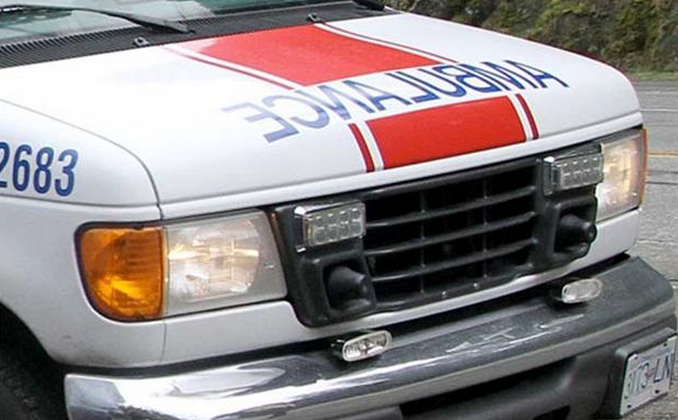Paramedic Lisa Jennings spends hours every day answering emails.

She has been diagnosed with post-traumatic stress disorder (PTSD) and has launched a website, You Are Not Alone, to help other first responders also suffering from the disorder.
Jennings was a paramedic in Alberta and British Columbia for 24 years before an incident in June 2014 triggered her PTSD. She now spends her time trying to help others.
“I must answer at least 80 emails or contacts from my website a day,” Jennings said.
She understands what people are going through, because she has hit rock bottom. At one point Jennings was living in her car, contemplating taking her own life, but she decided she needed to change her future.
“I sat there and I thought, ‘I have given half of my life to service. I’ve put my life in danger,'” she said.
She now takes it upon herself to keep track of the number of first responders in B.C. who have committed suicide following a PTSD diagnosis.
Jennings said so far this year, B.C. has lost six paramedics, six police officers, one corrections officer and one firefighter to suicide. She said many were waiting for their compensation claims from WorkSafeBC or the Workers’ Compensation Appeal Tribunal to go through.
She says many suicides go unreported and the numbers are likely much higher.
- ‘Bacterial vampirism’: Deadly pathogens attracted to human blood, study finds
- Shoppers faces proposed class action over claims company is ‘abusive’ to pharmacists
- Most Canadian youth visit dentists, but lack of insurance a barrier
- Landmark smoking ban that would phase out sales passes U.K. parliament
Jennings herself has been waiting for B.C.’s Workers’ Compensation Board for about 11 months to get insurance benefits for her PTSD. She now receives an income assistance of $900 a month. A decision was set to be made within six months, but Jennings is still waiting. She has had 10 psychiatric reports, nine of which confirm she has PTSD.
She has also been trying to get legislation passed in B.C. to follow other provinces’ examples when it comes to first responders and PTSD.
Following other provinces’ examples
Alberta, Ontario, Manitoba and New Brunswick have all introduced legislation to recognize PTSD as a work-related illness for police, firefighters and paramedics.
In June, Saskatchewan’s New Democrats tabled a bill for presumed Workers’ Compensation Board (WCB) coverage for anyone with work-related PTSD, regardless of his or her profession.
In B.C., under the Worker’s Compensation Act, any worker is entitled to compensation for a mental disorder that “does not result from an injury for which the worker is otherwise entitled to compensation.” However, that’s only if the mental disorder is either a reaction to a traumatic event at work, including bullying or harassment, is diagnosed by a psychiatrist or psychologist and is not caused by a decision of the employer, such as discipline or termination.
WATCH: A B.C. veteran is fighting Veterans Affairs for treatment that she says is helping her chronic pain and PTSD. Robin Gill reports.

Amending the B.C. Workers’ Compensation Act
In February, MLA for Vancouver-Hastings Shane Simpson introduced an amendment to the act to remove the hurdles from first responders having to prove their PTSD arose from an incidence or incidents at work. Under this legislation, if a first responder is suffering from an incidence of PTSD, it would be deemed to be a result of their occupation, unless there was evidence outlining otherwise.
Simpson told Global News after the bill passed the first reading, it became the government’s decision to call it for a second reading and further progress. However, they decided not to.
Minister of Jobs, Tourism and Skills Training and Responsible for Labour Shirley Bond said in a statement the government wants “all workers to have safe and healthy workplaces and we recognize there can be work-related impacts on peoples’ mental health.”
“That’s why we’ve made sure B.C. has among the broadest workers’ compensation legislation for mental disorders in Canada. In 2012, we expanded workers’ compensation coverage for diagnosed, work-related mental disorders through legislation (Bill 14). That legislation includes coverage for PTSD. The legislation covers work-related mental disorders arising from one or more traumatic events; a significant work-related stressor, including bullying or harassment; or a cumulative series of significant work-related stressors.”
Once a claim is accepted, WorkSafeBC provides funding for a number of different treatments for PTSD and other mental disorders and they have a specialized Mental Health Claims Unit.
Bond said in December 2015, WorkSafeBC created a steering committee to focus on prevention of mental disorders such as PTSD.
“The committee is working to create a cultural shift so first responders recognize risk factors for mental health and are aware of the resources and best practices available to help,” Bond said.
“I look forward to seeing what kind of recommendations and results we get from the working group to help inform our next steps.”
Bond also said employers have the primary responsibility for the safety of their workers and first responders have a range of supports available to them through their workplaces.
‘It’s not enough’
Jennings says more needs to be done fast to help first responders.
“If you get treatment, appropriate treatment by a psychologist that specializes in PTSD and first responders within three months or less, the reality of it is, you have a 90 per cent chance of returning to the work you love,” she said.
“We’re there 24/7, 365, no matter the weather, no matter what the call is, we will help you. How many first responders have to die before this province realizes that?”
Any worker can file a claim with WorkSafeBC here.
Workers may also call WorkSafeBC to register a claim during business hours at 1-888-967-5377.
WATCH: An internal Vancouver police union report revealed that as many as one third of its members are dealing with post traumatic stress disorder while on the job. John Daly explains the impact this can have on the work.



Comments